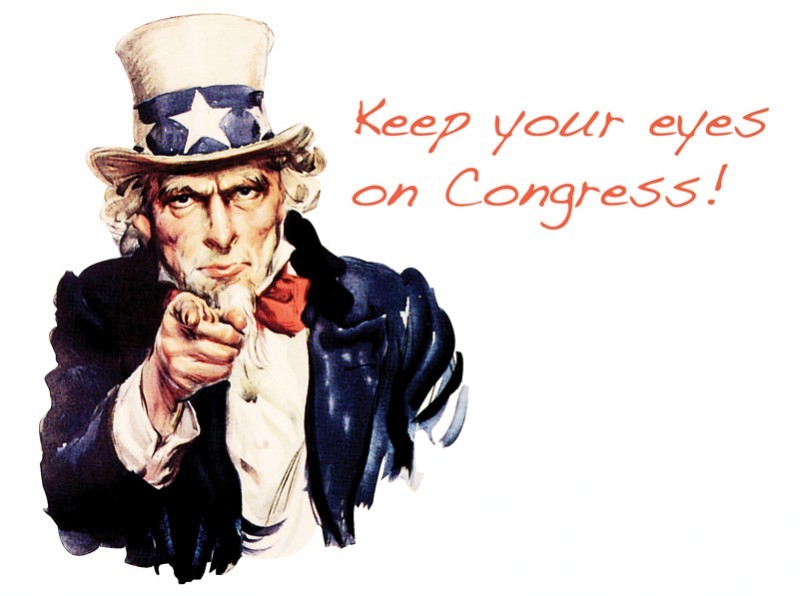Who gets to keep the tax cuts?
Courtesy photo: Wikimedia Commons
Opinion – Keep Your Eyes on Congress
December 4, 2010
If you haven’t been paying attention to politics as finals draw near, you probably haven’t realized that the big issue facing Congress this December is end of the Bush-era tax cuts. Way back in 2001, when most students at Iowa State had not yet entered high school, tax cuts were enacted to, in effect, give back the budget surplus generated during the Clinton years.
The cuts enacted in 2001 were fairly minor and resulted in about 1 percent lower tax rates for many Americans. In 2003, President Bush convinced Congress that small business owners needed further cuts to boost the economy, providing another 2 percent in cuts across the board, with slightly higher cuts for the highest and lowest tax brackets.
This means that an individual living in poverty during the last decade making $6,000 per year saved $300 due to the Bush cuts, while an individual making $350,000 per year saved $16,100 in taxes thanks to the cuts. On the other hand, an individual making approximately $20,000 per year would not have seen a change in tax rates during the last decade.
Congress is currently fighting over what to do when the cuts made between 2001 and 2003 expire at the end of the year. Democrats have proposed making the tax breaks for all but the highest tax bracket permanent, while allowing the highest bracket to return to a 39.6 percent tax rate from 35 percent in recent years. A second proposal last week from Sen. Charles E. Schumer, D-NY, instead would make the breaks permanent for anyone earning less than $1 million, while forcing those 1 percent of Americans that earn more than $1 million per year to pay 4.9 percent more of their income in taxes — their rates would rise from 35 percent to 39.6 percent. That extra income would be specifically allocated toward programs like Head Start, school construction and child nutrition programs around the country.
Republicans argue that the tax cuts need to be retained across the board to spark consumer spending.
Personally, if I had the financial skills to make more than $1 million a year, I’d probably take the extra $46,000-plus I get from the current tax cuts and invest it to make more money rather than spending it on a new American-made car. If I could invest that one year’s gain at a conservative 5 percent annual growth rate, the amount would double in less than 15 years. Actually, if I kept making $1 million per year and investing the money at 5-percent interest, I’d have gathered enough for a Tesla Roadster in 16 years.
Tax cuts would do much more immediate good when given to those who would benefit from extra money to spend on essential items like food and clothing.
I would say millionaires don’t need the extra windfall from the Republican party. They should consider themselves lucky at their 35 to 40 percent tax rate when their predecessors in the 1930s, ’40, ’50, ’60s and ’70s paid tax rates more than 60 percent and up to 90 percent at times.
Perhaps this drop in tax rates over the past four decades has led to the rising disparity between the super-rich and the poor in the United States. While 90 percent tax rates are amazingly high, rates of 40 percent, 50 percent or even 60 percent would not cause those in the highest tax bracket to starve by any means.
An even bigger reason the rich can easily get richer while the poor stay poor is the capital gains tax rates, which have steadily dropped during our lifetimes. Back in 1990, the long-term capital gains tax rate investors must pay on sales of securities was the same as the rate they paid on income. It was later changed to a flat 28 percent and slowly lowered to 15 percent for those individuals above the poverty level.
It is no wonder that many corporate executives are mostly paid in stock options and stock, a good example being Apple CEO Steve Jobs, who has famously been paid an annual salary of $1 since his return to Apple in 1997. While President Barack Obama has recently worked to raise the capital gains rate back to 20 percent, that rate can still provide substantial savings to the richest Americans, who pay nearly 50 percent less taxes on securities than on normal income.
This lets many extremely rich Americans technically pay net tax rates that are on par with families that earn around $100,000 per year and save a lot of money.
Republicans need to stop pushing their agenda to give more money to the rich. Is arguing over a 4.6 percent increase in taxes for the rich important enough to stall Congress and possibly allow the tax deductions to expire for all Americans? Maybe Democrats should suggest bumping rates for the rich by 10 percent. That would really get the Republicans mad — though 50 percent wouldn’t be a massive tax rate from a historical perspective.
I believe that if our government is spending more money than it receives in taxes, it should increase taxes accordingly. Otherwise, Americans see only the benefits of higher government spending without being forced to pay for the spending increases.
It’s not fair to simply pawn off your debts onto your children and your grandchildren. If our country raised taxes slightly and managed to balance its budget, I would see that as a good thing. A budget surplus would be even better, allowing us to pay off the national debt.
Nobody likes to pay taxes, but you must admit American tax rates are not unreasonably high. It’s better to pay for our current government spending and/or reduce spending than to simply allow the national debt to increase, don’t you think?







